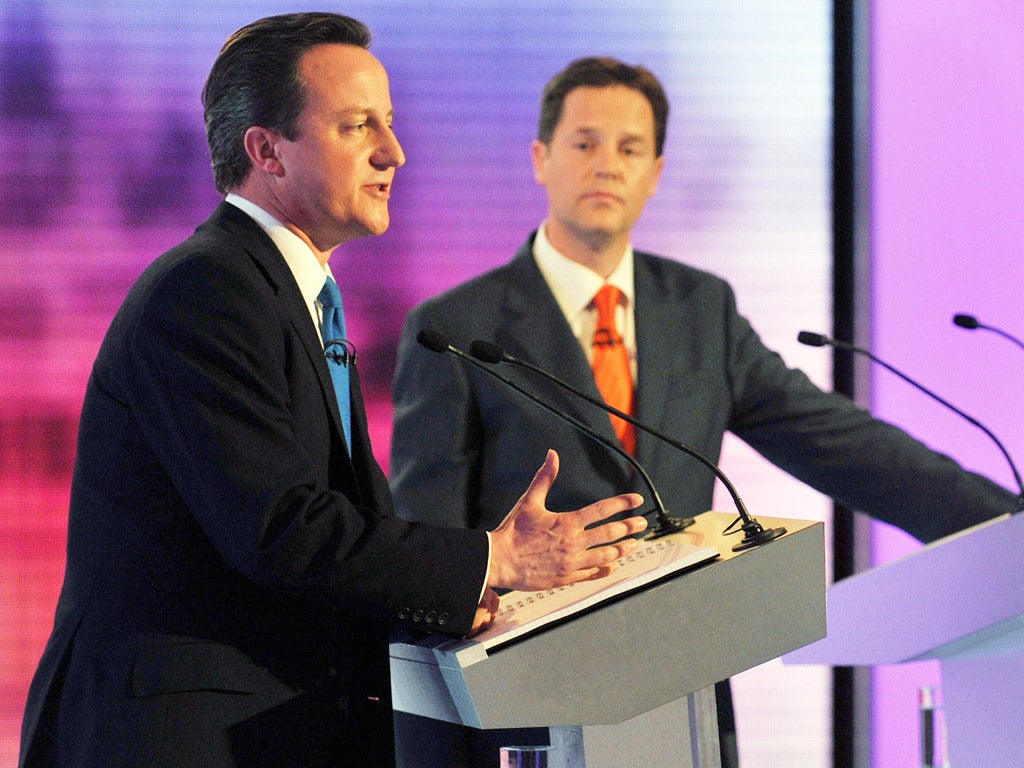No television debates before the next General Election? Conservatives reluctant to give Ed Miliband and Nick Clegg an equal platform in 2015
The three 90-minute debates before the last election attracted huge audiences

The Conservatives may be cooling on the idea of repeating the televised debates between the three main party leaders in 2010 at the next general election.
Although David Cameron’s aides denied he wants to duck a re-run of the US Presidential-style debates held two years ago, Labour, the Liberal Democrats and broadcasters fear that the Tories may throw up obstacles to re-running them next time.
When Mr Cameron failed to win an overall majority in 2015, some senior Tories argued he had been wrong to demand Britain’s first TV election showdowns. Next time, some Tory advisers may argue that, as Prime Minister, he should not allow Ed Miliband and Nick Clegg an equal platform.
In public, the Tories are unlikely to oppose a re-run, which would be criticised as an attempt to stifle the democratic process. The three 90-minute debates last time attracted huge audiences, the first one drawing almost 10m people. But other parties suspect the Tories may make unrealistic demands in the negotiations on how the debates would work that could prevent the parties and broadcasters reaching agreement. Such stalling tactics have been used by parties in previous elections when they did not believe debates would be to their advantage.
Talks between the parties and TV companies are due to start shortly. Although many politicians thought the debates would become a permanent feature of UK elections, the broadcasters’ fears were voiced today by Nick Robinson, the BBC’s political editor. He said no one should assume a second series will happen. “I am beginning to hear doubts about whether agreement will be possible for debates in 2015,” he said. “Many Conservatives are convinced that the 2010 debates ended David Cameron’s hopes of securing a majority. They gave Nick Clegg a huge boost and the hullabaloo that surrounded them diverted the spotlight from Gordon Brown’s record.
“Some close to Mr Cameron will argue that he should not make the same mistake twice. Why risk giving a platform to Ed Miliband to establish himself in the public mind as a potential prime minister?”
If the debates go ahead, they are bound to be very different to 2010 since the Tories and Liberal Democrats will defend the Coalition’s record, potentially giving their leaders an advantage over Labour. At the same time, Mr Clegg will want to fight the election as an independent party and “differentiate” from the Tories.
A Labour source said: “What we hear on the grapevine is very worrying. If the Tories back away from something which engaged the electorate, we will not let them wriggle off lightly.” Mr Miliband wants to open up the debates more to the audience, so that the public get a right of reply after the three leaders have answered their question.
A Lib Dem source said: “We hope and expect debates will happen next time. The idea that parties could deprive people of something that proved successful would be a very bad thing.” The first debate in 2010 sparked what became known as “Cleggmania” as the Lib Dems soared in the polls, although it did not last and they ended up with fewer MPs after the election.
A Tory source said last night: “The election is more than two years away. This is just not on the agenda at the moment.”
Some critics believe it was unhealthy that the 2010 debates broadcast by the BBC, ITV and Sky News dominated the entire campaign, leaving less room for debate on policy. But failure to repeat them in 2015 would be seen by many voters as a backward step.
Join our commenting forum
Join thought-provoking conversations, follow other Independent readers and see their replies
Comments
Bookmark popover
Removed from bookmarks